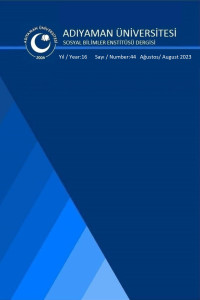Abstract
Kültür ve eğitim faaliyetleri dünya çapında bir kamu diplomasisi unsuru olarak kullanılmaktadır. Kültür ve eğitim faaliyetleri sayesinde milletler arasında karşılıklı anlayış gelişir ve uzun vadeli ilişkiler güçlenir. Değişim programlarının kamu diplomasisinde başarılı bir araç olabilmesi için, ulusların yabancıların söylediklerini dinlemesi, geliştirmesi ve kendi çıkarlarını iletmesi gerekir. İnsanlar birbirini tanıdıkça ve anladıkça yakınlaşır, yanlış anlaşılmalar giderilir ve uzun vadeli ilişkiler kurulup çeşitli işbirlikleri için fırsatlar yaratılır. Bu çalışma, Covid-19 Pandemisi sürecinde değişim diplomasisi bağlamında sanal erasmus+ hareketliliğini değerlendirerek kamu diplomasisine katkı sağlama durumunu belirlemeyi amaçlamaktadır. Nitel araştırma yöntemlerinden betimsel analizin kullanıldığı bu çalışmada amaç bölümünde sorulan araştırma sorularına Türkiye'ye gelen öğrencilerle yapılan yapılandırılmış görüşmeler yoluyla yanıt aranmaktadır. Bu araştırma, sanal hareketliliği değişim diplomasisi çerçevesinde inceleyen ilk çalışma olup, sanal değişim programlarının kamu diplomasisine de katkı sağlayabileceğini ortaya koymaktadır.
Keywords
Değişim diplomasisi deneyim değişimi kamu diplomasisi karşılıklı anlayış sanal hareketlilik
References
- Bettie, M. (2020). “Exchange Diplomacy: Theory, Policy and Practice in The Fulbright Program.” Place Brand Public Diplomacy, 16: 212–223.
- European Commission. https://erasmus-plus.ec.europa.eu/resources-and-tools/statistics-and-factsheets (Date of Access: 10.01.2023).
- Lima Júnior, A. F. (2007). “The Role of International Educational Exchanges in Public Diplomacy.” Place Branding and Public Diplomacy, 3 (3): 234-251.
- Kim, J. (2016). “Public Relations and Public Diplomacy in Cultural and Educational Exchange Programs: A Coorientational Approach to the Humphrey Program.” Public Relations Review, 42 (1): 135-145.
- Özel, M. (2021). Cultural Diplomacy and Educational Diplomacy in Turkey. On the Axis of International Exchange Programs. Ankara: Nobel.
- Sevin, E. (2010). “From Visitors To Cultural Ambassadors: Public Diplomacy and Scholar Exchange Programs.” Business Research Yearbook, 17: 578-585.
- Snow, N. (2009). Routledge Handbook of Public Diplomacy. Valuing Exchange of Persons in Public Diplomacy (233). New York: Routledge.
- Scott-Smith, G. (2011). “Cultural Exchange and the Corporate Sector: Moving Beyond Statist Public Diplomacy?” Austrian Journal of Political Science, 3: 301-313.
- Scott-Smith, G. (2009). Routledge Handbook of Public Diplomacy. Exchange Programs and Public Diplomacy. (50). New York: Routledge.
- Taylor, H. (2006). The Practice of Public Diplomacy. Public Diplomacy, Practitioners, Policy Makers, and Public Opinion (47). Washington: USC Center on Public Diplomacy and the Pew Research Center.
- Waithaka, J. W. and Maluki, P. (2016). “International Education Exchanges As A Public Diplomacy Instrument.” International Journal of Science Arts and Commerce, 1(3): 1-8.
- Yıldırım, Ş. and Şimşek, H. (2016). Qualitative Research Methods in the Social Sciences. Ankara: Seçkin.
Abstract
Around the world, cultural and educational events are employed as a component of public diplomacy. Due to cultural and educational activities, there is a growth in mutual understanding between nations and a strengthening of long-term relations. Countries must listen to what others have to say in order to develop and effectively articulate their own interests. This is necessary for exchange programs to be effective public diplomacy tools. People get more connected to one another as they get to know and understand one another, miscommunications are cleared up, and lasting relationships are developed to open doors for various types of partnerships. By assessing virtual Erasmus+ mobility in the framework of exchange diplomacy during the Covid-19 Pandemic phase, this study seeks to ascertain the status of making a contribution to public diplomacy. Answers to the research questions posed in the purpose section of the study are sought through structured interviews with international students using descriptive analysis, one of the qualitative research methodologies. This study is the first to evaluate virtual mobility within the context of exchange diplomacy, and it shows that programs for virtual exchange will also support public diplomacy.
References
- Bettie, M. (2020). “Exchange Diplomacy: Theory, Policy and Practice in The Fulbright Program.” Place Brand Public Diplomacy, 16: 212–223.
- European Commission. https://erasmus-plus.ec.europa.eu/resources-and-tools/statistics-and-factsheets (Date of Access: 10.01.2023).
- Lima Júnior, A. F. (2007). “The Role of International Educational Exchanges in Public Diplomacy.” Place Branding and Public Diplomacy, 3 (3): 234-251.
- Kim, J. (2016). “Public Relations and Public Diplomacy in Cultural and Educational Exchange Programs: A Coorientational Approach to the Humphrey Program.” Public Relations Review, 42 (1): 135-145.
- Özel, M. (2021). Cultural Diplomacy and Educational Diplomacy in Turkey. On the Axis of International Exchange Programs. Ankara: Nobel.
- Sevin, E. (2010). “From Visitors To Cultural Ambassadors: Public Diplomacy and Scholar Exchange Programs.” Business Research Yearbook, 17: 578-585.
- Snow, N. (2009). Routledge Handbook of Public Diplomacy. Valuing Exchange of Persons in Public Diplomacy (233). New York: Routledge.
- Scott-Smith, G. (2011). “Cultural Exchange and the Corporate Sector: Moving Beyond Statist Public Diplomacy?” Austrian Journal of Political Science, 3: 301-313.
- Scott-Smith, G. (2009). Routledge Handbook of Public Diplomacy. Exchange Programs and Public Diplomacy. (50). New York: Routledge.
- Taylor, H. (2006). The Practice of Public Diplomacy. Public Diplomacy, Practitioners, Policy Makers, and Public Opinion (47). Washington: USC Center on Public Diplomacy and the Pew Research Center.
- Waithaka, J. W. and Maluki, P. (2016). “International Education Exchanges As A Public Diplomacy Instrument.” International Journal of Science Arts and Commerce, 1(3): 1-8.
- Yıldırım, Ş. and Şimşek, H. (2016). Qualitative Research Methods in the Social Sciences. Ankara: Seçkin.
Details
| Primary Language | English |
|---|---|
| Journal Section | Articles |
| Authors | |
| Early Pub Date | August 31, 2023 |
| Publication Date | August 31, 2023 |
| Published in Issue | Year 2023 Issue: 44 |


